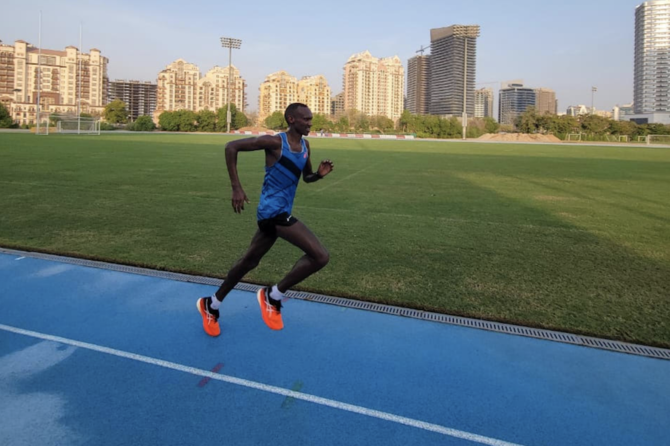DUBAI: You’re the runner that leads the marathon. You’re faster than most of the field. The one that even the Olympians are chasing. But you never cross the line first, if at all.
That’s the life of the pacersetter.
Paul Muturi of Kenya is one of the best, consistently setting the tempo that elite runners need to match to win races and break records.
In a nation famed for churning out medium- and long-distance champions, Muturi started running as a form of escape. Mostly, escape from ennui brought about by civil unrest.
“I got serious about it in 2008. This is when we had an election in Kenya, and there was post-election violence. I found myself sitting the whole day, doing nothing, life was just messed up,” he said. “So I was like, why don’t I find something I can do to keep myself busy and forget about everything that is going on.”
At 24, he found what he was looking for. Running would change his life.
“When peace came back and everything was back to normal, because I saw I was making progress, and I loved it, I continued from there and I never stopped,” Muturi said.
In 2011, Muturi decided to leave Kenya, armed with the knowledge that running could open doors for him wherever he ended up.
“I just want go away somewhere and move away from my usual life in Kenya,” he said.
That somewhere turned out to be Dubai. Running, he said, proved a pathway to finding regular work as well.
“I knew that my running will get me out of every situation I’ll be in, I knew that running was the only way,” he said. When you’re a runner, you meet managers, you meet big people in companies. When you’re both running, when you both have your shoes and your shorts on and you meet in running club, that manager would want to talk to you and see how you do your running, how you eat your food, your lifestyle. I knew when I left Kenya, when I came here, I’ll still have a life because I’ll meet people who love running.”
His first job was as the “IT guy” at Abela & Co, the established food management firm.
“I kept doing my running although it was hectic, the salary was not that great,” he remembers.
His boss and former Arab triathlon champion, Roy Nasr, was tragically killed after being hit by a drunk driver while on a bike ride near Safa Park in 2013. He had already had a major influence on Muturi’s career.
“He really supported me and tried to get me a better job in the office,” said the Kenyan. “At the same time that he passed away I got another job through a friend. It was at a logistics company (Blue Axis Shipping) and I stayed there for some time. My boss liked me so much and even paid for me to go to London, I did a 10k there back in 2015. We came back, I continued in my running.”
From 2018, he has been working as a sales coordinator at Global Climbing Trading. And still running.
Make no mistake, Muturi is formidable competitor in his own right, and his personal best time of 2 hours 30 minutes for a marathon makes him one of Dubai’s fastest runners. In 2018 he was chosen as an Asics FrontRunner and now represents the Japanese brand in the region.
But it is his role as pacesetter for other runners that has increasingly brought him attention, and in recent times he has worked with Gerda Steyn, the South African Dubai resident who finished 15th in the Women’s Marathon at the Tokyo 2020 Olympics.
“We’d known each other for few years and last year she approached me after COVID and asked if I could assist her with the speed sessions,” Muturi said. “She was good in long runs, but you cannot do speed by yourself, you need someone who is quicker than you. She has a coach in South Africa, she gets her program from there, and then I do the pacing for her.”
“Currently we are doing more speed sessions and tempo runs, and she’s preparing for the Cape Town Marathon next month (Oct. 17),” he added. “If flights had been allowed earlier I would have prepared well and I would have gone with her to do the pacing there.”
Muturi has his own races to run, but says the heat and humidity of Dubai’s summer months have been “killing him,” as he prepares for the start of the city’s running season.
“I’m coming back slowly, trying to put on milage, 20k, 25k and now going almost to 30k, in a weekend,” he said. “I’m trying to do 120k in a week, including both speed sessions and long runs as I wait for her to come back, and the season is about start also.”
“Next weekend I might do the Ajman run, but I’m sure I will not perform well in the first race, I just want to get my rhythm back,” he said with a heavy dose of humility. “I’ll do 5k, and maybe do another 5k in the Super Sports Night Time (series). By then I know my rhythm would have come back. You get the rhythm from racing, not from training.”
After that, he is eyeing the Creek Striders Half Marathon and potentially the 10k at the Abu Dhabi Marathon on November 26.
Pacesetting, by definition, is a selfless undertaking. It comes with sacrifices. You do the work so that others benefit.
“You must concentrate, you need to check the watch all the time,” Muturi said. “If her coach says we have to run at three minutes per kilometer, you need to keep checking the speed. Maybe after 200m, after 400m. Everything is on you, you need to check how she is breathing. If she’s struggling you need to find out. If she’s slowing down you need to encourage her to push. Or if you see she is not responding you need to slow down a little bit so she could catch up. She just has to follow you, she doesn’t have to do anything else.”
Is there ever a temptation to not pull out of the race, to just keep going, maybe even cross the line first? He laughs at the suggestion, but maintains this is a serious business.
“The pace setter can screw up, you’re the one who can make or break her race,” he insists. “They’re the person who is on your heal, they just follow you. So if you slow down their pace, you screw up. If you go quicker maybe you burn them, because you’re taking them at a pace they are not used to.”
Most mornings and evenings you can find Muturi on the running track of Dubai Sports City and, for longer runs, at Nad Al-Sheba cycling park. Occasionally he’ll hit the trails of Jebel Jais or Showkah village in Ras Al Khaimah.
At 37, he is happy, and happy to keep on running. To keep on setting the pace.
“I love sports,” he said. “I would love to work with a sports brand in the future. When I see a new pair of (running) shoes, I go mad. I like when I’m walking around in my full Asics gear, that’s my passion. If I can do that in the future, I’ll be really, really happy.”















